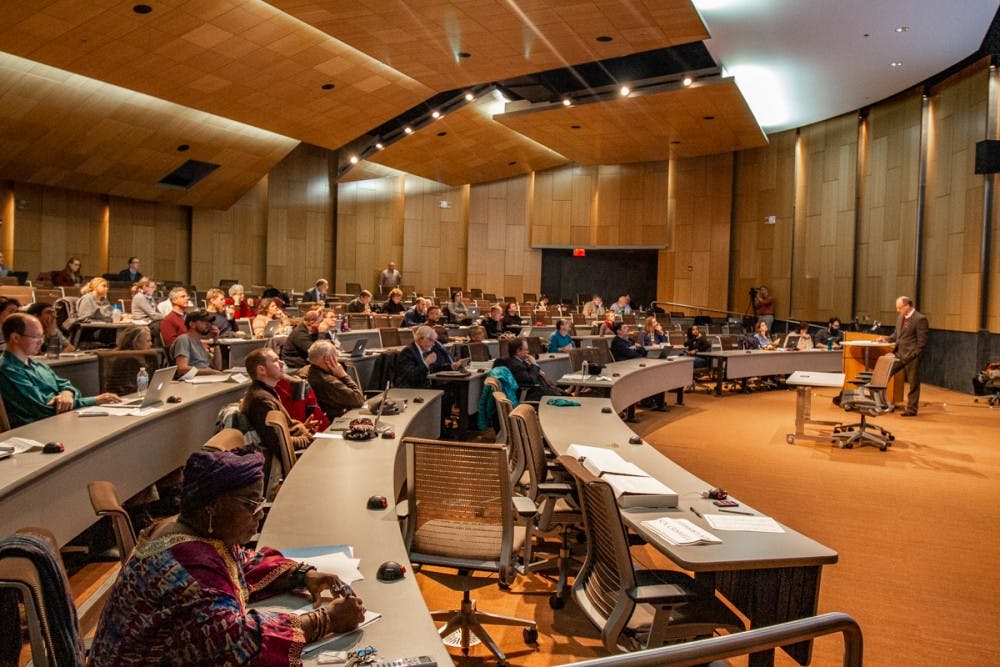Vice President Barrie Wilkes explains Monday snow closure to Academic Senate
Davies addressed enrollment decrease during President's Report

Academic Senate meets Jan. 29 in the French Auditorium in the College of Education and Human Services.
Vice President of Finance and Administrative Services Barrie Wilkes explained his decision to close the university during the snowstorm on the morning of Jan. 28 at the Academic Senate meeting on Jan. 29.
Wilkes said the discussion started at 4:45 a.m. when Jonathan Webb, associate vice president of facilities management, called him. Wilkes, who lives in Alma, said he looked out the window and it wasn’t snowing yet. After some discussion, they decided not to go through the closure process. Wilkes said it still wasn’t snowing when he got up and drove to campus.
“When I got to work, things deteriorated pretty rapidly in terms of weather, and so we made the decision to close,” he said. Wilkes said he is the person who decides whether CMU closes for weather issues, although he discusses the decision with other administrators and staff members before making that decision. He also said the decision to close is based on safety, not finances.
Several senators expressed concerns about making up missed class days, especially since the university announced it would also be closed on Wednesday, Jan. 30.
Senator Tracy Davis, English language and literature faculty, suggested using “Gentle Thursday and Friday” as make-up days, if necessary. Senator John Allen, Earth and atmospheric sciences faculty, suggested that faculty use Blackboard and other forms of technology to facilitate learning when students can’t come to campus.
Student Senator Elizabeth Colvin asked why the sidewalk along Washington St., which runs from Anspach Hall to Ronan Hall, wasn’t plowed. She said that she and many other students use that sidewalk to get from Lot 22 to North Campus.
Wilkes explained that in CMU’s critical path map, the critical paths are the first priority of Facilities Management. However, he also explained that the sidewalk Colvin referred to, among others, should have been plowed after the critical paths were completed. He said if there is a path that isn’t plowed or salted enough, students and faculty can call Facilities Management at (989) 774-6547 to report it.
Declining enrollment
President Robert Davies talked about the CMU’s enrollment decline. Davies explained that enrollment has steadily dropped for 10 years, but the most significant decrease has happened in the last five years. There have been large decreases, specifically Davies pointed out, in the number of freshmen and transfer students.
“We must face the fact that our market share over the last few years has dropped,” Davies said. “That means we are not keeping pace with our peers.”
Davies said he wants to increase CMU’s market share in Detroit and Grand Rapids. He also wants to recruit more students from other states like Ohio, Indiana and Wisconsin.
His goals for CMU include having students from all 50 states – currently the university has students from 47 – to increase out-of-state enrollment to 30 percent and to obtain a student population of 22,000.
He wants to achieve these goals by improving recruitment efforts in high schools.
“Recruitment for a (new freshman) begins 18 months before their first semester,” he said.
Additional business
The Senate approved a change to the computer science major. The change will increase the amount of science classes students are required to take.
The major now requires nine computer science classes, four math and statistics classes and nine credits of computer science electives.
With the change, the major will still have the math requirement, and will add a requirement for 6-10 credits of a natural science like biology, chemistry or physics.







